CHAPTER V
HEALTH AND ENDURANCE
Secretary, Physical Department International Committee Young Men’s Christian Association
Fitness
Two things greatly affect the conditions under which a boy lives in these days. One is that he lives in-doors for the greater part of the time, and the other is that he must attend school, which is pretty largely a matter of sitting still. Two things therefore are needs of every boy: out-door experience and physical activity.
To secure endurance, physical power, physical courage, and skill, the first thing needful is to take stock of one’s physical make-up, put the body in the best possible condition for doing its work and then keep it in good order.
Proper Carriage
Head up, chin in, chest out, and shoulders back is a good slogan for a boy scout who desires an erect figure. One can scarcely think of a round-shouldered scout. Yet there are such among the boys who desire to be scouts.
There is no particular exercise that a boy can take to cure round shoulders. The thing to remember is that all exercise that is taken should be done in the erect position, then the muscles will hold the body there.
An erect body means a deeper chest, room for the important organs to work and thus affords them the best chance to act.
A few setting-up exercises each day in the erect position will help greatly to get this result.
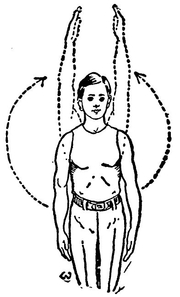
Position: Heels together, arms down and at sides, palms in.
Movement: Swing arms, sideways, upward to vertical, and return.
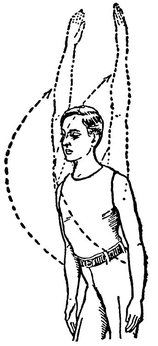
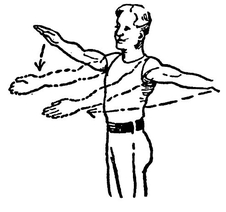
Exercise 3
Position: Arms extended to side horizontal.
Movement: Swing forward and return.
(Emphasis upon backward movement.)
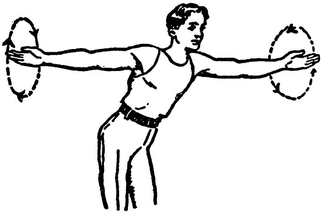
Exercise 4
Position: Arms at side, horizontal, back slightly arched.
Movement: Circle arms backward.
Setting-up Exercises
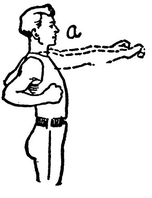
Exercise 5
Position: Forearms flexed at side of chest.
Movement: Thrust arms forward and return.
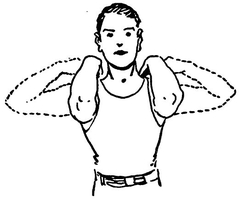
Position: Arms at front, horizontal, forearms flexed, fingers on shoulders.
Movement: Swing backward to side, horizontal in position.
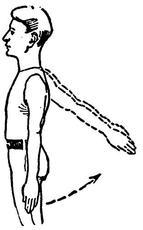
Exercise 7
Position: Same as Exercise 6.
Movement: Swing downward, forward, bringing arms beyond sides of body. Rise on toes with end of backward swing.

Exercise 8a
Position: Arms at vertical, thumbs locked, head fixed between arms.
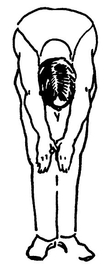
Movement: Bend forward as far as possible, without bending knees, and return.

Exercise 9a
Position: Arms at vertical. Repeat exercise 8b
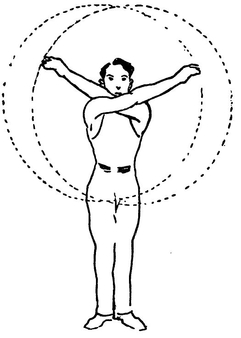
Exercise 9b
Movement: Arm circles, downward, inward, across chest. Reverse the movement.
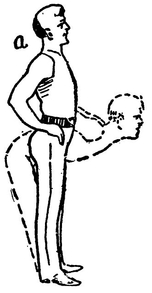
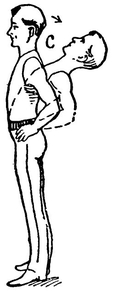
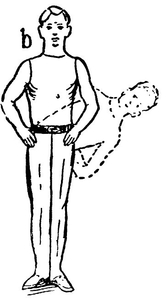
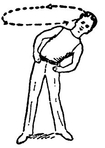

Exercise 14
Position: Same as Exercise 10.
Movement: Raise high on toes.
(Hold shoulders back firmly)
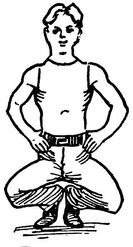
Setting-up Exercises
Growth
The chief business of a boy is to grow. He may have other affairs, but this is his chief concern. He should, therefore, have a few simple rules for living and make them a part of his daily life.
Out-door Exercises
Each day should have its out-door exercises. Walking is a splendid form of exercise. Walk to school or business; don’t ride unless absolutely necessary because of unusual distance. Walk with a good, swinging stride with chest well up and spine fairly straight. Slow running across country is great; it lacks strain and yet affords splendid stimulation to heart and lungs. Cross-country running and hiking should be favorite sport for scout patrols and troops. A boy ought to have at least two hours of sport daily in some good, vigorous game, such as baseball or tennis, and, if he can possibly afford it, at least two periods a week, of an hour each, in a gymnasium, where he can receive guidance in body building. Boys under sixteen should avoid exercise of strain, such as weight lifting, or sprint running over one hundred yards, or long distance racing. They should have careful guidance in all gymnastic work. Work on apparatus may prove harmful unless of the right sort. The horse and parallel bars should be used largely to jump over rather than perform upon. Exercises demanding a sustained support of the body with the arms are not helpful, but may be harmful. The chief activity should be of the legs, to strengthen heart and lungs. A boy should be careful not to overdo. In his excitement to win in a contest he is likely to do this unless cautioned. A boy should never try to reduce his weight. Now that there are weight classes in sports for boys there is a temptation to do this and it may prove very serious. Severe training for athletics should be avoided. All training should be in moderation.
Medical Examinations
Every boy ought to have, as he takes up his boy-scout work, a thorough medical examination. Some physician who is interested in boys will be willing to act as examiner for a patrol or troop. A boy should know the condition of his heart and lungs before entering any contest. If he has any defects in his breathing apparatus — nose, throat, or lungs, these should be attended to or they will seriously interfere with his endurance tests.
Baths
Beside exercises a boy should have simple, workable rules for living. A boy ought to take a good soap bath at least twice a week and always after he has played a hard game or performed work of a nature that has caused him to perspire freely.
Each morning a quick sponge bath should be the first order of the day, in water as cool as he can stand it, followed by a good rub with a coarse towel. If there is a feeling of warmth after the bath, it is helpful, if not, the water should be slightly warm or only a portion of the body should be bathed at a time.
Pain
One thing that should be regarded seriously is pain in any form in any part of the body. If there is a dull headache frequently, find out what causes it. Pain in the knee, the arch of the foot, or at any point, should be taken seriously. Pain means something wrong. It may be brave to bear it, but it is not wise. It may mean something serious. Remember that pain felt in one part of the body may be the result of something wrong in another part. See a wise doctor about it.
Eating
And now in reference to what one shall eat. The average boy ought to have and usually does have an appetite like an ostrich. Three points to remember are; don’t eat too much, most healthy boys do; don’t eat meat more than once a day; and, third, don’t eat anything that you always taste for several hours after you have eaten it, even though you like it.
Digestion
The fact that you taste it is an indication that your stomach is having a wrestling match with the food. Some people can’t digest onions, others thrive upon them. Some can’t eat cucumbers, others can do so readily. The one must give them up; the other can continue to eat them. Each person has some peculiarity of diet and must observe it to be happy. Many a race has been lost through failure to obey this rule. A simple diet is best. Most boys eat too much of a mixed nature. They mix pickles, soda water, frankfurters, and chocolate without fear or favor. No wonder there is so much stomach ache. In boys’ camps the chief trouble is indigestion caused by this riot of eating. Such boys are laying up for themselves for the future some beautiful headaches and bilious attacks, which, when they become chronic later, will cry out against them and seriously impair their value. Don’t eat when very tired; lie down a while and get rested. Don’t eat heavily before exercising, or, better, put it the other way around, don’t exercise immediately after eating. Never eat when excited or angry and very lightly when worried or when expecting to study hard. We should learn to eat slowly and chew the food thoroughly remembering that all food before it can be taken up in the blood must be as thin as pea soup. Chewing well will help the digestive organs greatly. Always wash the hands before eating. Be careful about eating food that has been exposed to the dust unless it has been washed. Drink freely of clean water between meals. Never use a public drinking cup without thoroughly rinsing it. Don’t touch your lips to the rim of the cup.
Boys who cook their own meals when in camp should be careful to have their food well done. Half-baked and soggy food proves indigestible.
Coffee and Tea
Should a boy drink coffee or tea? This is a question often asked by boys. Coffee and tea are the greatest stimulants known. But does a strong boy need a stimulant? What is a stimulant and what does it do? A stimulant is a whip, making the body do more at a given time than it ordinarily would. It doesn’t add any fibre to the tissues, doesn’t add any strength, isn’t a food, but merely gets more out of the tissues or nervous system than they would ordinarily yield. Of course there is a reaction, because the tissues have had nothing to feed on. Herbert Fisher says that Peary’s men, who drank lots of tea on their voyage north, during the most trying time of their trip showed it in their haggard faces and loss of tissue. Their own tissues had turned cannibal and fed on their own material. Stimulants are not foods. They add no strength to the body. They exact of the body what ought not to be exacted of it. There is always a reaction and one is always worse off as a result. Growing boys especially should have nothing to do with tea, coffee, or any stimulant.
Alcohol and Tobacco
Alcohol is not a stimulant, but is really a narcotic that is very depressing. It dulls rather than stimulates. The same is true of nicotine in tobacco. No growing boy should use either. The first athletes to drop out of a race are usually drinkers and all trainers know that smoking is bad for the wind.
Constipation
Those boys who find their digestion sluggish and are troubled with constipation may find the following plan helpful in overcoming the condition:
Drink a cool, copious draught of water upon arising. Then take some body-bending exercises. Follow this with the sponge bath. Then, if possible, take a walk around the block before breakfast. After school, play some favorite game for at least an hour. In the absence of this, take a good hike of three or four miles or a longer bicycle ride. At least twice a week, if possible, enter a gymnasium class and make special emphasis of body-bending exericses.
Have a regular time for going to stool. A good plan is to go just before retiring and immediately upon arising. Go even though you feel no desire to do so. A regular habit may be established by this method. Always respond quickly to any call of nature. Toasted bread and graham bread and the coarser foods and fruit will be found helpful.
The Teeth
Closely related to the matter of eating is the proper care of the teeth.
Perhaps — without care — the mouth is the filthiest cavity of the body. We spend a great deal of energy trying to keep food clean and water pure, but what is the use if we place them in a dirty cavity as they enter the body. Full 90 per cent of the children examined in our schools have decayed and dirty teeth. These decayed teeth provide cavities in which food particles decay and germs grow, and through which poisons are absorbed. These conditions need not exist. Now just a few suggestions about the care of the teeth. Every boy should own his own tooth brush. The teeth should be scrubbed at least twice a day. At night they should receive most careful cleansing, using a good tooth paste or powder. Then again in the morning they should be rinsed at which time simply clean water is sufficient. Time should be taken in the cleansing of the teeth. The gums should be included in the scrubbing, as this acts as a good stimulant to the circulation of the blood to the teeth. Not only should the teeth be brushed with a backward and forward stroke, as we ordinarily do, but also upward and downward the length of the teeth. In addition to the scrubbing, particles of food which are lodged between the teeth should be removed after meals, or at least after the last meal of the day. This is most safely done by the use of a thread of a fair degree of thickness. Dentists and druggists furnish this thread in spools. Hard toothpicks often cause bleeding and detach fillings. A dentist should be visited once every six months so as to detect decay immediately. Never have a tooth pulled unless absolutely necessary.
Care of the Eyes
Most troubles with the eyes come from eye strain. Styes and red lids are usually due to this cause. See how foolish, therefore, it is to treat these conditions as causes, when really they are only the result of something else. Of course there are exceptions. Sometimes wild hairs and skin disease affect the eyes. Eye strain should be removed by wearing well-fitting glasses and then these other conditions will disappear. If constant headache is experienced or the eyes itch or become tired easily, there is possibly eye strain.
One way to test the eye is for vision. Place the following letters fifteen feet from you. If you cannot read them clearly with both eyes and with each eye separately, consult a first-class oculist.
CLVFOT
EACFDLOT
DVCLAEOTF
Never buy eye-glasses unless fitted by an expert. Such glasses should be worn in proper relation to the eyes. They should not be permitted to slide forward on the nose or tilt. They may need to be changed often as the eyes grow better.
For reading, a good, steady light is needed. Never sit in front of a window facing it to read. Always have the light come from the rear and over the left shoulder preferably. The book .should be held on a level with the face and not too close. Sit erect. Reading when lying down or from the light of a fireplace is unwise.
Care of the Ears
Affections of the ears are exceedingly serious and may lead to grave results. Any trouble with them should be given very prompt attention and a good specialist consulted. Pain in the ear, or ringing or hissing sounds, and particularly any discharge from the ear, should not be neglected. Any sign of deafness must be heeded. Sometimes deafness occurs in reference to some particular sounds while hearing is normal to others. No matter what the degree of deafness may be do not neglect to see a physician about it. Ordinarily the tick of a watch can be heard at a distance of thirty inches. If you cannot hear it at that distance and can hear it say at fifteen inches then you are just one half from the normal in your hearing. The test should be made with one ear closed.
Ear troubles are often caused by sticking foreign objects in the ear, such as hair pins, pins, matches, toothpicks and lead pencils. Never pick the ear with anything. Often the ear drum is pierced in this way. The normal ear does not require anything more than the usual cleansing with the wash rag over the end of the finger.
If wax to any extent accumulates in the ear it should be removed by syringing, but ought to be done by a physician.
In camp an insect might crawl into the ear and if alive cause pain. Putting oil or other fluids in the ear to drown it is unwise. If a foreign body should get in the ear it should not cause great alarm unless attended with severe pain. If a physician is not available at once such objects may remain for a day or two without serious results. Syringing usually removes them, but it should be remembered that some objects like peas or beans swell if made wet. In swimming water is apt to get into the ear and cause annoyance. A rubber ear stop can be secured and placed in the ear at the time of swimming, thus keeping the water out. Cotton should not be stuffed into the ear to keep water out, as it may get inside.
One thing to keep in mind is that catarrh of the nose and throat often extends into the ear passages through a tube which reaches from the throat to the ear and that syringing of the nose and throat frequently causes trouble in the ear.
Care of Nose and Throat
Always breathe through the nose. Air passing through the nose is warmed and moistened and cleansed; thus it gets to the lungs in a better condition. If you cannot breathe clearly through the nose, have it examined. There may be a growth present which needs to be removed. To become a good runner this is important. Adenoids, which are growths far back in the mouth, often interfere with nose breathing and are serious in other ways. Don’t stick anything in the nose; and nose picking is not cleanly. If crusts form in the nose, use a little vaseline to soften them. Don’t blow the nose too vigorously. It may cause trouble.
Frequent sore throat may be due to enlarged tonsils which either need treatment or removal. To one who has frequent colds in the head, the out-of-door life and morning sponge bath and moderate eating will be of help.
Care of the Feet
This is an important matter with scouts, as they will make frequent hikes and tramps. The first thing to do is to walk right. The straight foot is the normal foot. The normal foot is broad at the ball with space between the toes. How different from the awful feet we see with toes twisted upon each other and crowded together. Walk with feet pointing straight forward. The feet that turn outward are weak feet. Shoes therefore should be straight on the inner border, broad across the ball, and have a low, broad heel. The shoe adopted by the scout movement is a good design.
When a foot is normal, the inner border does not touch the floor. By wetting the foot one can see readily whether he is flat-footed by the imprint made. The following exercises are good to strengthen the arches of the foot if there is a tendency to flat feet: (1) Turn toes in, raise the heels, and come down slowly on the outer borders of the feet; (2) Walk with heels raised and toes pointing inward, or walk on the outer borders of the foot, inner borders turned up.
Shoes should fit the feet comfortably. Tight shoes, or shoes that fit loosely, will cause callouses or corns. The way to get rid of these is to remove the cause — namely, the badly-fitting shoes. Soft corns are due to pressure between the toes. The toes in such cases should be kept apart with cotton. Pointed shoes should be avoided. Patent-leather shoes are non-porous and hot. Ingrown toe nails are exceedingly painful. The pain comes from the nail piercing the soft parts. Allowing the nail to grow long and beyond the point of the tender spot will help; and on the side of the nail and under it cotton should be inserted to protect the soft parts.
Hot foot baths will generally relieve tired feet. Boys should be very careful in trimming corns for fear of blood poisoning. Never buy plates at a store for flat feet. They may not be adapted to your needs. Always consult a foot specialist for treatment and buy plates if needed on his order. Only severe cases need plates.
Many boys are troubled with perspiring feet and are frequently annoyed by the odor resulting. Those who are thus troubled should wash the feet often and carefully, especially, between the toes. By dusting the feet with boric acid the odor will disappear. At first it may be necessary to change the stockings daily. In severe cases two pairs of shoes should be used, changing alternately.
Care of the Finger Nails
The chief thing in the care of the finger nails is to keep them clean. Each boy should possess and use a nail brush. Always wash the hands thoroughly before eating, and use the end of a nail file to remove the accumulation still remaining under the nails. Keep the nails properly trimmed. They should not be too long nor too short. If long they are liable to break and if short to be sensitive. Biting the nails is a filthy practice and mutilates the fingers dreadfully and makes them unsightly. It is a very hard habit to overcome ofttimes and will require persistent effort in order to succeed. By keeping the nails smooth the tendency to bite them will to some extent be overcome. A bitter application to the nails will often remind one of the habit, as often the biting is done unconsciously. The nails should never be pared with a knife; a curved pair of scissors is better as the cutting should be done in a curved direction; but the best method is to use a file. The skin overhanging the nails should be pressed back once a week to keep them shapely. Rubbing the nails with a nail buffer or cloth will keep them polished.
Sleep
One thing a growing boy wants to be long on is sleep, and yet he is most apt to be careless about it. It is during sleep that a boy grows most and catches up. During his waking hours he tears down and burns up more tissue than he builds. Good, sound and sufficient sleep is essential to growth, strength, and endurance. A boy scout should have at least nine or ten hours sleep out of every twenty-four. If you lose out on this amount on one day, make it up the next. Whenever unusually tired, or when you feel out of trim, stay in bed a few hours more if it is possible. A boy should wake up each morning feeling like a fighting cock. When he doesn’t he ought to get to bed earlier that night. Sleep is a wonderful restorative and tonic. It helps to store up energy and conserve strength.
Sleeping Out of Doors
The conditions under which one sleeps are as important as the length of time one sleeps. Many people are finding it wonderfully helpful and invigorating to sleep out of doors. Often a back porch can be arranged, or, in summer, a tent can be pitched in the yard. But, by all means, the sleeping room should be well ventilated. Windows should be thrown wide open. Avoid drafts. If the bed is in such relation to the windows as to cause the wind to blow directly on it, a screen can be used to divert it or a sheet hung up as protection. Good, fresh, cool air is a splendid tonic. In winter open windows are a splendid preparation for camping out in summer.
Conservation
In this chapter much has been said of the active measures which a boy should take in order to become strong and well. We should be equally concerned in saving and storing up natural forces we already have. In the body of every boy, who has reached his teens, the Creator of the universe has sown a very important fluid. This fluid is the most wonderful material in all the physical world. Some parts of it find their way into the blood, and through the blood give tone to the muscles, power to the brain, and strength to the nerves. This fluid is the sex fluid. When this fluid appears in a boy’s body, it works a wonderful change in him. His chest deepens, his shoulders broaden, his voice changes, his ideals are changed and enlarged. It gives him the capacity for deep feeling, for rich emotion. Pity the boy, therefore, who has wrong ideas of this important function, because they will lower his ideals of life. These organs actually secrete into the blood material that makes a boy manly, strong, and noble. Any habit which a boy has that causes this fluid to be discharged from the body tends to weaken his strength, to make him less able to resist disease, and often unfortunately fastens upon him habits which later in life he cannot break. Even several years before this fluid appears in the body such habits are harmful to a growing boy.
To become strong, therefore, one must be pure in thought and clean in habit. This power which I have spoken of must be conserved, because this sex function is so deep and strong that there will come times when temptation to wrong habits will be very powerful. But remember that to yield means to sacrifice strength and power and manliness.
For boys who desire to know more of this subject we would suggest a splendid book by Dr. Winfield S. Hall, entitled, “From Youth into Manhood.” Every boy in his teens who wants to know the secret of strength, power, and endurance should read this book.
NOTES
Notes
Notes
Notes